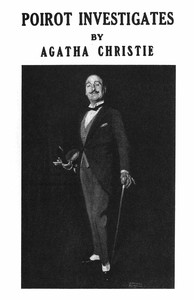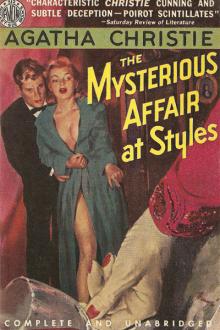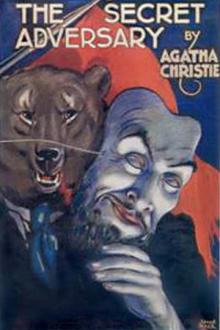Poirot Investigates by Agatha Christie (10 ebook reader .TXT) 📗

- Author: Agatha Christie
Book online «Poirot Investigates by Agatha Christie (10 ebook reader .TXT) 📗». Author Agatha Christie
“What did your uncle say?”
“He seemed rather annoyed, but went off at once. It was about five minutes later that I heard the sound of raised voices. I ran out into the hall and almost collided with Mrs. Middleton. Then we heard the shot. The gun-room door was locked on the inside, and we had to go right round the house to the window. Of course that took some time, and the murderer had been able to get well away. My poor uncle”—her voice faltered—“had been shot through the head. I saw at once that he was dead. I sent Mrs. Middleton for the police. I was careful to touch nothing in the room but to leave it exactly as I found it.”
I nodded approval.
“Now, as to the weapon?”
“Well, I can make a guess at it, Captain Hastings. A pair of revolvers of my husband’s were mounted upon the wall. One of them is missing. I pointed this out to the police, and they took the other one away with them. When they have extracted the bullet, I suppose they will know for certain.”
“May I go to the gun-room?”
“Certainly. The police have finished with it. But the body has been removed.”
She accompanied me to the scene of the crime. At that moment Havering entered the hall, and with a quick apology his wife ran to him. I was left to undertake my investigations alone.
I may as well confess at once that they were rather disappointing. In detective novels clues abound, but here I could find nothing that struck me as out of the ordinary except a large bloodstain on the carpet where I judged the dead man had fallen. I examined everything with painstaking care and took a couple of pictures of the room with my little camera which I had brought with me. I also examined the ground outside the window, but it appeared to have been so heavily trampled underfoot that I judged it was useless to waste time over it. No, I had seen all that Hunter’s Lodge had to show me. I must go back to Elmer’s Dale and get into touch with Japp. Accordingly I took leave of the Haverings, and was driven off in the car that had brought us up from the station.
I found Japp at the Matlock Arms and he took me forthwith to see the body. Harrington Pace was a small, spare clean-shaven man, typically American in appearance. He had been shot through the back of the head, and the revolver had been discharged at close quarters.
“Turned away for a moment,” remarked Japp, “and the other fellow snatched up a revolver and shot him. The one Mrs. Havering handed over to us was fully loaded and I suppose the other one was also. Curious what darn fool things people do. Fancy keeping two loaded revolvers hanging up on your wall.”
“What do you think of the case?” I asked, as we left the gruesome chamber behind us.
“Well, I’d got my eye on Havering to begin with. Oh, yes!” noting my exclamation of astonishment. “Havering has one or two shady incidents in his past. When he was a boy at Oxford there was some funny business about the signature on one of his father’s cheques. All hushed up of course. Then, he’s pretty heavily in debt now, and they’re the kind of debts he wouldn’t like to go to his uncle about, whereas you may be sure the uncle’s will would be in his favour. Yes, I’d got my eye on him, and that’s why I wanted to speak to him before he saw his wife, but their statements dovetail all right, and I’ve been to the station and there’s no doubt whatever that he left by the 6.15. That gets up to London about 10.30. He went straight to his club, he says, and if that’s confirmed all right—why, he couldn’t have been shooting his uncle here at nine o’clock in a black beard!”
“Ah, yes, I was going to ask you what you thought about that beard?”
Japp winked.
“I think it grew pretty fast—grew in the five miles from Elmer’s Dale to Hunter’s Lodge. Americans that I’ve met are mostly clean-shaven. Yes, it’s amongst Mr. Pace’s American associates that we’ll have to look for the murderer. I questioned the housekeeper first, and then her mistress, and their stories agree all right, but I’m sorry Mrs. Havering didn’t get a look at the fellow. She’s a smart woman, and she might have noticed something that would set us on the track.”
I sat down and wrote a minute and lengthy account to Poirot. I was able to add various further items of information before I posted the letter.
The bullet had been extracted and was proved to have been fired from a revolver identical with the one held by the police. Furthermore, Mr. Havering’s movements on the night in question had been checked and verified, and it was proved beyond doubt that he had actually arrived in London by the train in question. And, thirdly, a sensational development had occurred. A city gentleman, living at Ealing, on crossing Haven Green to get to the District Railway Station that morning, had observed a brown-paper parcel stuck between the railings. Opening it, he found that it contained a revolver. He handed the parcel over to the local police station, and before night it was proved to be the one we were in search of, the fellow to that given us by Mrs. Havering. One bullet had been fired from it.
All this I added to my report. A wire from Poirot arrived whilst I was at breakfast the following morning:
“Of course black bearded man was not Havering only you or Japp would have such an idea wire me description of housekeeper and what clothes she wore this morning same of Mrs. Havering do not waste time taking photographs of interiors they are underexposed and not in the least artistic.”
It seemed to me that Poirot’s style was unnecessarily facetious. I also fancied he was a shade jealous of my position on the spot with full facilities for handling the case. His request for a description of the clothes worn by the two women appeared to me to be simply ridiculous, but I complied as well as I, a mere man, was able to.
At eleven a reply wire came from Poirot:
“Advise Japp arrest housekeeper before it is too late.”
Dumbfounded, I took the wire to Japp. He swore softly under his breath.
“He’s the goods, Monsieur Poirot! If he says so, there’s something in it. And I hardly noticed the woman. I don’t know that I can go so far as arresting her, but I’ll have her watched. We’ll go up right away, and take another look at her.”
But it was too late. Mrs. Middleton, that quiet middle-aged woman, who had appeared so normal and respectable, had vanished into thin air. Her box had been left behind. It contained only ordinary wearing apparel. There was no clue in it to her identity, or as to her whereabouts.
From Mrs. Havering we elicited all the facts we could:
“I engaged her about three weeks ago when Mrs. Emery, our former housekeeper, left. She came to me from Mrs. Selbourne’s Agency in Mount Street—a very well-known place. I get all my servants from there. They sent several women to see me, but this Mrs. Middleton seemed much the nicest, and had splendid references. I engaged her on the spot, and notified the Agency of the fact. I can’t believe that there was anything wrong with her. She was such a nice quiet woman.”
The thing was certainly a mystery. Whilst it was clear that the woman herself could not have committed the crime, since at the moment the shot was fired Mrs. Havering was with her in the hall, nevertheless she must have some connection with the murder, or why should she suddenly take to her heels and bolt? I wired the latest development to Poirot and suggested returning to London and making inquiries at Selbourne’s Agency.
Poirot’s reply was prompt:
“Useless to inquire at agency they will never have heard of her find out what vehicle took her up to hunters lodge when she first arrived there.”
Though mystified, I was obedient. The means of transport in Elmer’s Dale were limited. The local garage had two battered Ford cars, and there were two station flies. None of these had been requisitioned on the date in question. Questioned, Mrs. Havering explained that she had given the woman the money for her fare down to Derbyshire and sufficient to hire a car or fly to take her up to Hunter’s Lodge. There was usually one of the Fords at the station on the chance of its being required. Taking into consideration the further fact that nobody at the station had noticed the arrival of a stranger, black-bearded or otherwise, on the fatal evening, everything seemed to point to the conclusion that the murderer had come to the spot in a car, which had been waiting near at hand to aid his escape, and that the same car had brought the mysterious housekeeper to her new post. I may mention that inquiries at the Agency in London bore out Poirot’s prognostication. No such woman as “Mrs. Middleton” had ever been on their books. They had received the Hon. Mrs. Havering’s application for a housekeeper, and had sent her various applicants for the post. When she sent them the engagement fee, she omitted to mention which woman she had selected.
Somewhat crestfallen, I returned to London. I found Poirot established in an arm-chair by the fire in a garish, silk dressing-gown. He greeted me with much affection.
“Mon ami Hastings! But how glad I am to see you. Veritably I have for you a great affection. And you have enjoyed yourself? You have run to and fro with the good Japp? You have interrogated and investigated to your heart’s content?”
“Poirot,” I cried, “the thing’s a dark mystery! It will never be solved.”
“It is true that we are not likely to cover ourselves with glory over it.”
“No, indeed. It’s a hard nut to crack.”
“Oh, as far as that goes, I am very good at cracking the nuts! A veritable squirrel! It is not that which embarrasses me. I know well enough who killed Mr. Harrington Pace.”
“You know? How did you find out?”
“Your illuminating answers to my wires supplied me with the truth. See here, Hastings, let us examine the facts methodically and in order. Mr. Harrington Pace is a man with a considerable fortune which at his death will doubtless pass to his nephew. Point No. 1. His nephew is known to be desperately hard up. Point No. 2. His nephew is also known to be—shall we say a man of rather loose moral fibre? Point No. 3.”
“But Roger Havering is proved to have journeyed straight up to London.”
“Précisément—and therefore, as Mr. Havering left Elmer’s Dale at 6.15, and since Mr. Pace cannot have been killed before he left, or the doctor would have spotted the time of the crime as being given wrongly when he examined the body, we conclude quite rightly, that Mr. Havering did not shoot his uncle. But there is a Mrs. Havering, Hastings.”
“Impossible! The housekeeper was with her when the shot was fired.”
“Ah, yes, the housekeeper. But she has disappeared.”
“She will be found.”
“I think not. There is something peculiarly elusive about that housekeeper, don’t you think so, Hastings? It struck me at once.”
“She played her part, I suppose, and then got out in the nick of time.”
“And what was her part?”
“Well, presumably to admit her confederate, the black-bearded man.”
“Oh, no, that was not her part! Her part was what you have just mentioned, to provide an alibi for Mrs. Havering at the moment the shot was fired. And no one will ever find her, mon ami, because she does not exist! ‘There’s no sech person,’ as your so great Shakespeare says.”
“It was Dickens,” I murmured, unable to suppress a smile. “But what do you mean, Poirot?”
“I mean that Zoe Havering was an actress before her marriage, that you and Japp only saw the housekeeper in a dark hall, a dim middle-aged figure in black with a faint subdued voice, and finally that neither you nor Japp, nor the local police whom the housekeeper fetched, ever saw Mrs. Middleton and her mistress at one and the same time. It was child’s play for that clever and daring woman. On the pretext of summoning her mistress, she runs upstairs, slips on a bright jumper and a hat with black curls attached which she jams down over the grey transformation. A few deft touches, and the make-up is removed, a slight dusting of rouge, and the brilliant Zoe Havering comes down with her clear ringing voice. Nobody looks particularly at the housekeeper. Why should they? There is nothing to connect her with the crime. She, too, has an alibi.”
“But the revolver that was found at Ealing? Mrs. Havering could not have placed it there?”
“No, that was Roger Havering’s job—but it was a mistake on their part. It put me on the right track. A man who has committed a murder with a revolver which he found on the spot would fling it away at once, he would not carry it up to London with him. No, the motive was clear, the criminals wished to focus the





Comments (0)